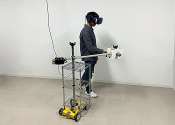Opening new doors in the VR world—literally
Room-scale virtual reality (VR) is one where users explore a VR environment by physically walking through it. The technology provides many benefits, given its highly immersive experience. Yet the drawback is that it requires ...
Mar 13, 2024
0
37









